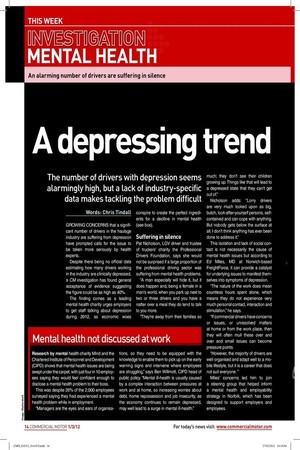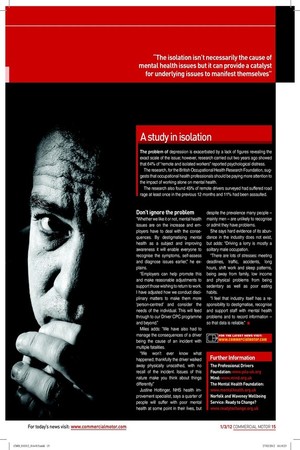MENTAL HEALTH
Page 10

Page 11

If you've noticed an error in this article please click here to report it so we can fix it.
An alarming number of drivers are suffering in silence
A depressing trend
The number of drivers with depression seems alarmingly high, but a lack of industry-specific data makes tackling the problem difficult
Words: Chris Tindall
GROWING CONCERNS that a significant number of drivers in the haulage industry are suffering from depression have prompted calls for the issue to be taken more seriously by health experts.
Despite there being no official data estimating how many drivers working in the industry are clinically depressed, a CM investigation has found general acceptance of evidence suggesting the figure could be as high as 40%.
The finding comes as a leading mental health charity urges employers to get staff talking about depression during 2012, as economic woes conspire to create the perfect ingredients for a declline in mental health (see box).
Suffering in silence
Pat Nicholson, LGV driver and trustee of truckers’ charity the Professional Drivers Foundation, says she would not be surprised if a large proportion of the professional driving sector was suffering from mental health problems.
“A man especially will hide it, but it does happen and, being a female in a man’s world, when you park up next to two or three drivers and you have a natter over a meal they do tend to talk to you more.
“They’re away from their families so much; they don’t see their children growing up. Things like that will lead to a depressed state that they can’t get out of.” Nicholson adds: “Lorry drivers are very much looked upon as big, butch, look-after-yourself persons, selfcontained and can cope with anything. But nobody gets below the surface at all. I don’t think anything has ever been done to address it.” This isolation and lack of social contact is not necessarily the cause of mental health issues but according to Ed Miles, MD at Norwich-based FreightForce, it can provide a catalyst for underlying issues to manifest themselves into symptoms of depression.
“The nature of the work does mean countless hours spent alone, which means they do not experience very much personal contact, interaction and stimulation,” he says.
“If commercial drivers have concerns or issues, or unresolved matters at home or from the work place, then they will often mull these over and over and small issues can become pressure points.
“However, the majority of drivers are well organised and adapt well to a mobile lifestyle, but it is a career that does not suit everyone. ” Miles’ concerns led him to join a steering group that helped inform a mental health and employability strategy in Norfolk, which has been designed to support employers and employees.
Don’t ignore the problem
“Whether we like it or not, mental health issues are on the increase and employers have to deal with the consequences. By destigmatising mental health as a subject and improving awareness it will enable everyone to recognise the symptoms, self-assess and diagnose issues earlier,” he explains.
“Employers can help promote this and make reasonable adjustments to support those wishing to return to work. I have adjusted how we conduct disciplinary matters to make them more ‘person-centred’ and consider the needs of the individual. This will feed through to our Driver CPC programme and beyond.” Miles adds: “We have also had to manage the consequences of a driver being the cause of an incident with multiple fatalities.
“We won’t ever know what happened; thankfully the driver walked away physically unscathed, with no recall of the incident. Issues of this nature make you think about things differently.” Justine Hottinger, NHS health improvement specialist, says a quarter of people will suffer with poor mental health at some point in their lives, but despite the prevalence many people – mainly men – are unlikely to recognise or admit they have problems.
She says hard evidence of its abundance in the industry does not exist, but adds: “Driving a lorry is mostly a solitary male occupation.
“There are lots of stresses: meeting deadlines, traffic, accidents, long hours, shift work and sleep patterns, being away from family, low income and physical problems from being sedentary as well as poor eating habits.
“I feel that industry itself has a responsibility to destigmatise, recognise and support staff with mental health problems and to record information – so that data is reliable.” ■
Further Information
The Professional Drivers Foundation: www.pda-uk.org Mind: www.mind.org.uk The Mental Health Foundation: www.mentalhealth.org.uk Norfolk and Waveney Wellbeing Service: Ready to Change? www.readytochange.org.uk
Mental health not discussed at work
Research by mental health charity Mind and the Chartered Institute of Personnel and Development (CIPD) shows that mental health issues are being swept under the carpet, with just four in 10 employees saying they would feel confident enough to disclose a mental health problem to their boss.
This was despite 26% of the 2,000 employees surveyed saying they had experienced a mental health problem while in employment.
“Managers are the eyes and ears of organisa tions, so they need to be equipped with the knowledge to enable them to pick up on the early warning signs and intervene where employees are struggling,” says Ben Willmott, CIPD head of public policy. “Mental ill-health is usually caused by a complex interaction between pressures at work and at home, so increasing worries about debt, home repossession and job insecurity, as the economy continues to remain depressed, may well lead to a surge in mental ill-health.”
A study in isolation
The problem of depression is exacerbated by a lack of figures revealing the exact scale of the issue; however, research carried out two years ago showed that 64% of “remote and isolated workers” reported psychological distress.
The research, for the British Occupational Health Research Foundation, suggests that occupational health professionals should be paying more attention to the impact of working alone on mental health.
The research also found 45% of remote drivers surveyed had suffered road rage at least once in the previous 12 months and 11% had been assaulted.












































